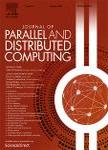版权所有:内蒙古大学图书馆 技术提供:维普资讯• 智图
内蒙古自治区呼和浩特市赛罕区大学西街235号 邮编: 010021

作者机构:Barcelona Supercomp Ctr Barcelona Spain Barcelona Supercomp Ctr Grp Parallel Programming Models Barcelona Spain Barcelona Supercomp Ctr Parallel & Distributed Programming Models Barcelona Spain
出 版 物:《JOURNAL OF PARALLEL AND DISTRIBUTED COMPUTING》 (并行与分布式计算杂志)
年 卷 期:2020年第137卷第0期
页 面:104-118页
核心收录:
学科分类:08[工学] 0812[工学-计算机科学与技术(可授工学、理学学位)]
基 金:European Union H2020 program through the INTERTWinE project Severo Ochoa Program - Spanish Government [SEV-2015-0493] Generalitat de Catalunya, Spain [2017-SGR-1414] Spanish Ministry of Science and Innovation (Computacion de Altas Prestaciones VII) [TIN2015-65316-P]
主 题:Parallel programming Hybrid programming MPI OpenMP OmpSs-2
摘 要:A wealth of important scientific and engineering applications are configured for use on high performance computing architectures using functionality found in the MPI specification. This specification provides application developers with a straightforward means for implementing their ideas for execution on distributed-memory parallel processing computers. OpenMP directives provide a means for operating on shared-memory regions of those computers. With the advent of machines composed of many-core processors, the strict synchronisation required by the bulk synchronous parallel (BSP) communication model can hinder performance increases. This is due to the complexity to handle load imbalances, to reduce serialisation imposed by blocking communication patterns, to overlap communication with computation and, finally, to deal with increasing memory overheads. The MPI specification provides advanced features such as non-blocking calls or shared memory to mitigate some of these factors. However, applying these features efficiently usually requires significant changes on the application structure. Task parallel programming models are being developed as a means of mitigating the abovementioned issues but without requiring extensive changes on the application code. In this work, we present a methodology to develop hybrid applications based on tasks called hierarchical domain overdecomposition with tasking (HDOT). This methodology overcomes most of the issues found on MPI-only and traditional hybrid MPI+OpenMP applications. However, by emphasising the reuse of data partition schemes from process-level and applying them to task-level, it enables a natural coexistence between MPI and shared-memory programming models. The proposed methodology shows promising results in terms of programmability and performance measured on a set of applications. (C) 2019 Elsevier Inc. All rights reserved.